Key takeaways:
- Reparations politics aim to address historical injustices and foster healing within marginalized communities by acknowledging past grievances.
- Local reparations initiatives are vital for promoting economic equity, community engagement, and civic pride, providing pathways for validation of historical experiences.
- Challenges such as public resistance, funding shortages, and defining eligibility for reparations threaten the effectiveness and implementation of these initiatives.
- Successful reparations efforts require a collaborative approach that incorporates the voices and lived experiences of those directly affected, aiming for lasting change for future generations.

Understanding reparations politics
Reparations politics can often feel overwhelming, but at its core, it’s about addressing historical injustices and their lingering impacts. I remember attending a local meeting where community members expressed their urgent need for acknowledgment and restitution after years of systemic disenfranchisement. Listening to those stories, I was struck by a poignant question: how can we truly move forward without recognizing the past?
The discussions around reparations can bring out strong emotions and opinions, reflecting deeply rooted feelings of pain and hope. I recall a conversation with a friend who shared her family’s history of land loss and economic hardship due to discriminatory practices. It made me realize that these initiatives are not solely about financial compensation; they aim to heal wounds and foster a sense of belonging and dignity within marginalized communities.
Engaging with reparations politics often requires grappling with complex truths about our social fabric. When I think about it, I wonder how different communities can come together to create solutions that are inclusive and effective. This is not merely a theoretical issue; it affects real lives, and each conversation we have can shape the future of our societal landscape.
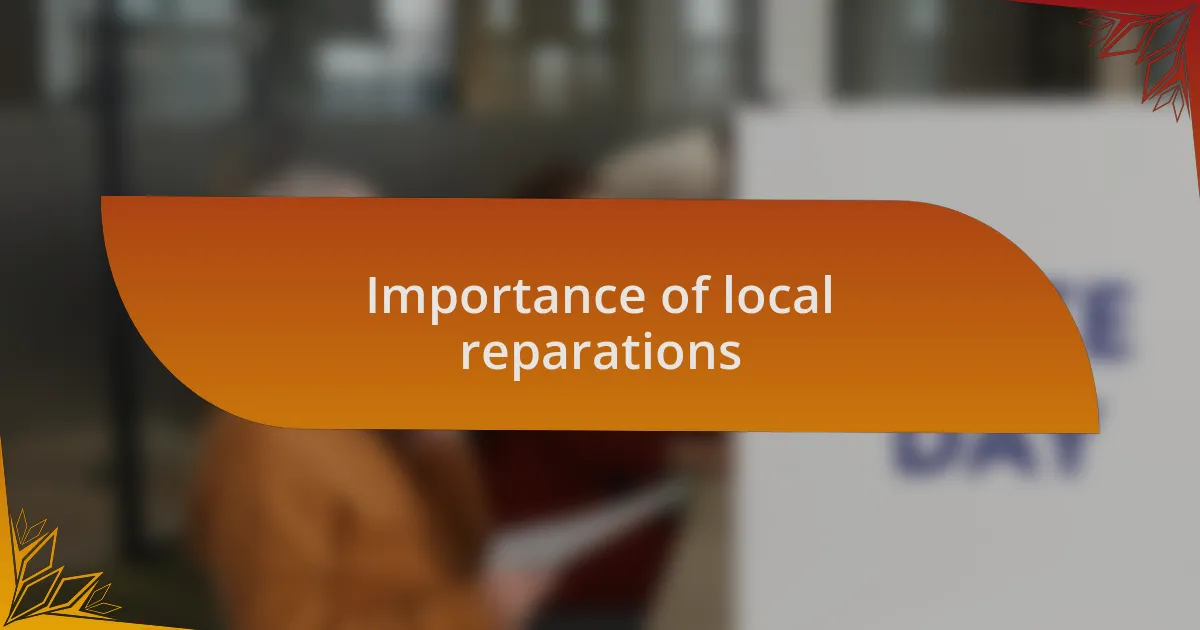
Importance of local reparations
Local reparations play a crucial role in fostering community healing and resilience. I remember attending a neighborhood assembly where a woman shared how her family had been marginalized for generations. Her words were loaded with pain and a yearning for acknowledgment, and it struck me that local reparations could serve as a pathway for communities to validate their histories and experiences.
Investing in local reparations initiatives not only addresses past injustices but also promotes economic equity. When I think about the small businesses in underserved neighborhoods that struggle to thrive, I can’t help but feel a sense of urgency for reparative measures. How can we expect these vibrant communities to flourish without nurturing the very roots that sustain them?
Additionally, local reparations initiatives encourage civic engagement and foster a sense of belonging. I have witnessed firsthand how community-driven efforts spark enthusiasm and participation among residents. It raises an important question: doesn’t everyone deserve a chance to thrive in a community that acknowledges their struggles? Engaging in these initiatives empowers individuals and brings about collective progress that benefits everyone.
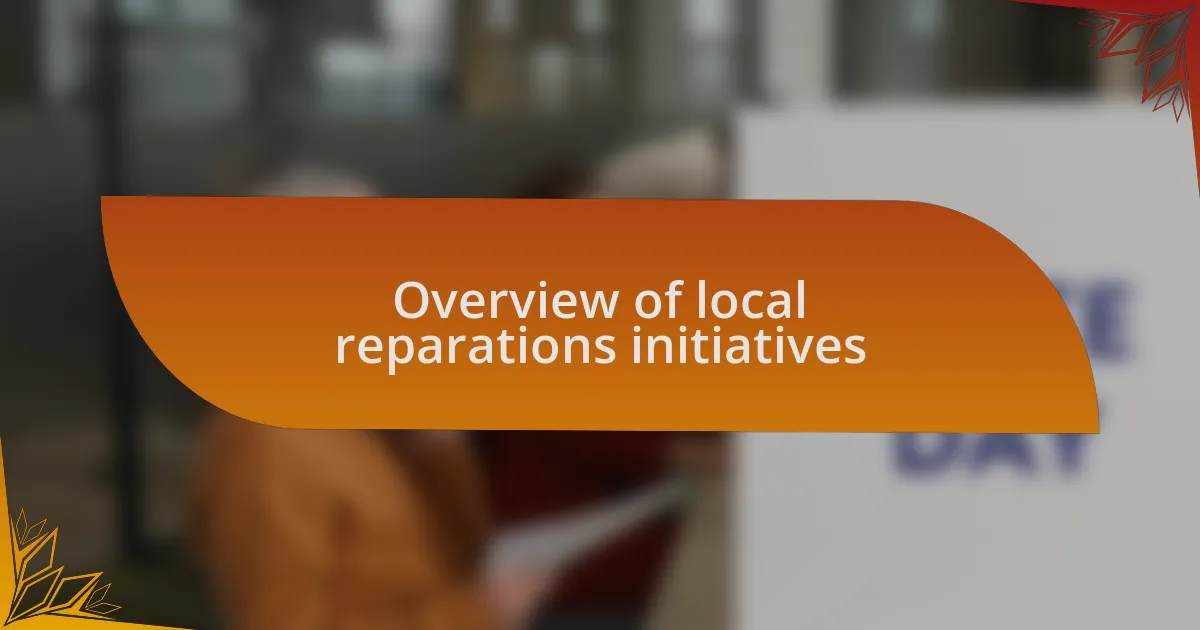
Overview of local reparations initiatives
Local reparations initiatives have emerged as tailored responses to specific historical injustices within communities. I’ve seen cities like Asheville, North Carolina, take bold steps to acknowledge their past, creating programs aimed at providing financial support for minority-owned businesses and affordable housing. It makes one wonder—could these initiatives serve as a model for other cities grappling with similar histories?
In many instances, these local efforts go beyond monetary compensation. I recall a community forum where residents discussed how reparations could encompass education programs that teach local history and promote cultural heritage. The emotional weight in the room was palpable as people expressed a deep desire for recognition and healing. It’s clear that reparations can be a multifaceted approach to restoring dignity and addressing systemic disparities.
Moreover, some local initiatives focus on reparative justice rather than traditional reparations. For example, I’ve encountered programs that prioritize restorative practices, encouraging dialogue and healing through community engagement. This approach can transform grievances into opportunities for understanding and reconciliation, which begs the question: how can we cultivate a lasting impact that extends beyond immediate financial gains?
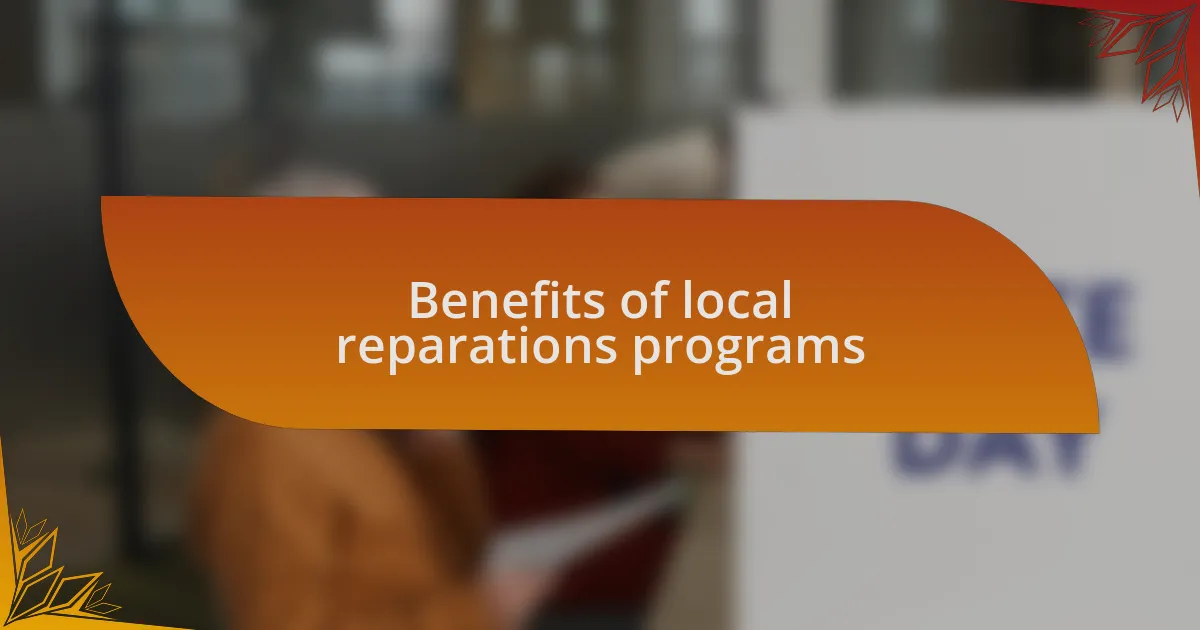
Benefits of local reparations programs
The benefits of local reparations programs are profound and varied. I’ve seen firsthand how such initiatives can revitalize communities by directly addressing historical injustices. For instance, when a city implements grants for minority-owned businesses, it creates not just economic opportunities but also fosters a sense of pride and ownership among residents. How powerful is it to witness local entrepreneurs recognizing their dreams where they once only saw barriers?
On a deeper level, local reparations foster community healing. I remember attending a workshop where citizens shared their experiences with systemic oppression. The emotional connection in that room was striking; it was as if the sharing itself became a form of reparative action. People began to see each other’s struggles as a shared history, paving the way for new dialogues and relationships. Isn’t it incredible how acknowledgment can bring people together in ways that money alone never could?
Furthermore, by centering local narratives and experiences, these programs build a more nuanced understanding of history. In one town, a local reparations initiative included a series of public discussions about the impact of redlining. Hearing stories from longtime residents wasn’t just enlightening; it instilled a collective responsibility for change that transcended generations. Doesn’t it feel right when we create spaces for such vital conversations? It’s this blend of economic support and emotional truth-telling that truly transforms communities.
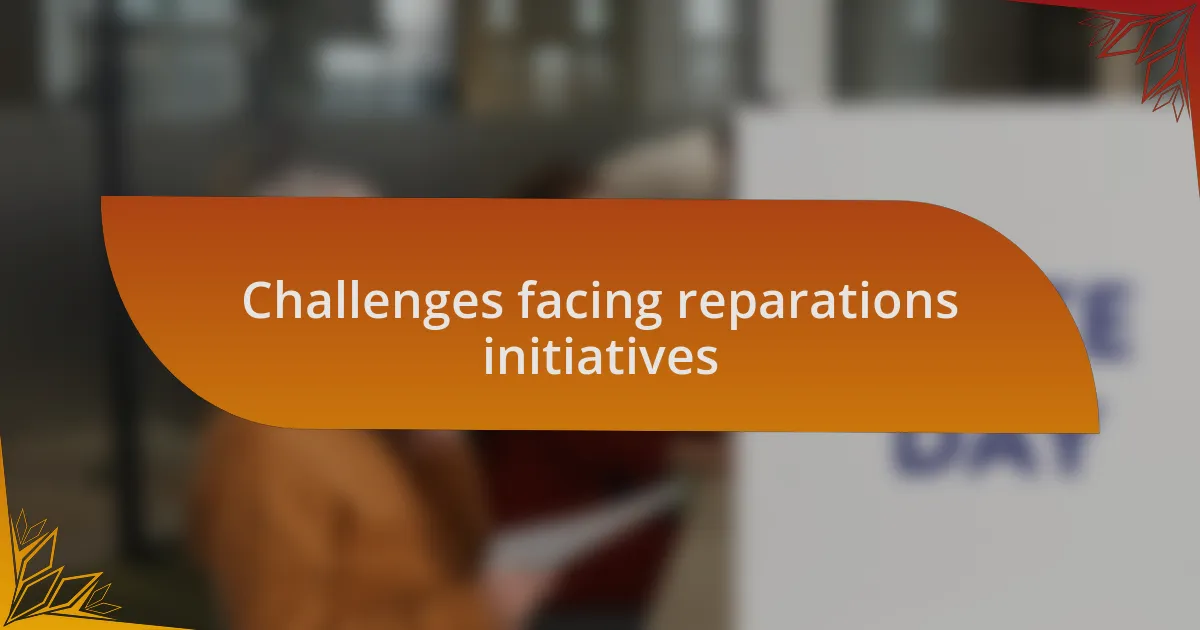
Challenges facing reparations initiatives
One significant challenge facing local reparations initiatives is public resistance. I’ve often encountered skepticism from individuals who question the very need for reparations, arguing it’s a form of reverse discrimination. This pushback can stall conversations and prevent communities from moving forward together. How can we change hearts and minds when so many are entrenched in a belief that equity leads to inequity?
Funding is another daunting obstacle. I recall a discussion in my community about implementing a reparations program, where the lack of financial resources was a recurring theme. It’s disheartening to see that while the support for reparative actions exists, translating that support into tangible investments demands innovative solutions. Are we prepared to dedicate the resources necessary to make this vision a reality, or will we continue to let opportunity slip through our fingers?
Additionally, the complexity of defining who qualifies for reparations poses a considerable hurdle. In many discussions I’ve participated in, people express confusion about eligibility criteria. It’s not merely a matter of historical lineage; it requires a nuanced understanding of who has been impacted by systemic injustices. How do we honor those who have suffered while ensuring that no one feels excluded? Finding that balance is crucial for fostering trust and collaboration within our communities.
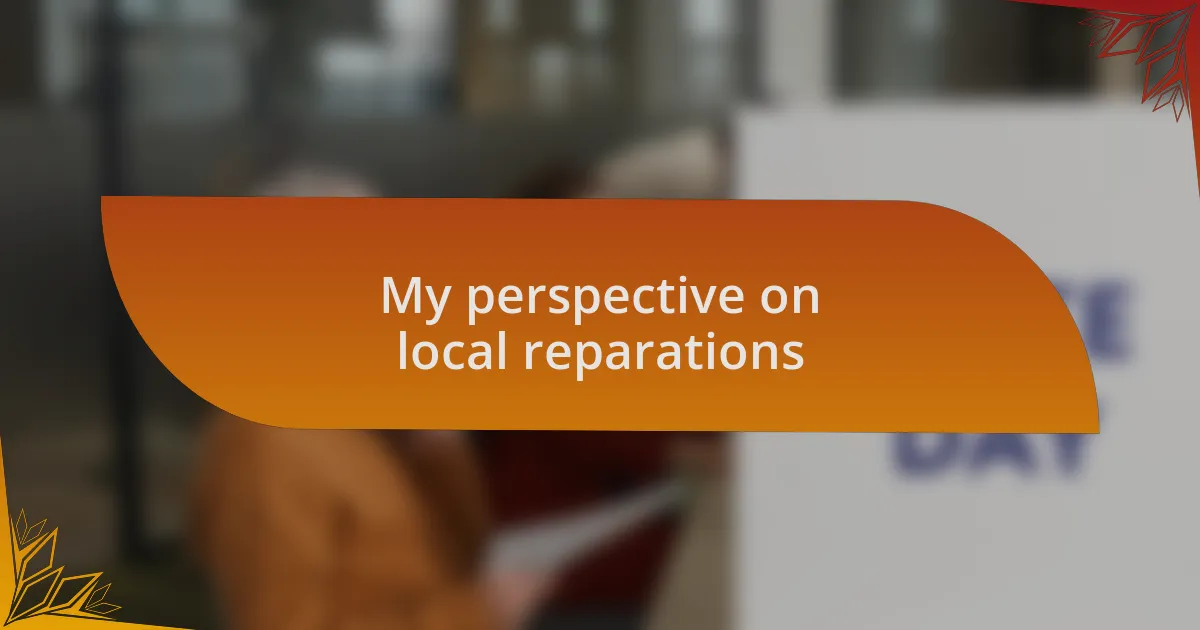
My perspective on local reparations
When I think about local reparations, I often reflect on the powerful stories I’ve heard from those directly affected by systemic injustices. One conversation I had with an elderly neighbor, who shared memories of discrimination and lost opportunities, changed my perspective profoundly. It’s these individual experiences that remind me that reparations are not just a policy issue; they embody real human suffering and resilience.
On another occasion, during a community forum, I witnessed a heartfelt debate on how to structure reparations. People were eager to contribute their ideas, but I could sense the underlying fear of getting it wrong. It made me realize that while intentions may be noble, we need to adopt a collaborative approach that genuinely listens to the voices of those we aim to help. How can we ensure that our reparative efforts resonate with authenticity and respect for the lived experiences of others?
Finally, I’m often left pondering the legacy we leave behind. If local reparations initiatives are to succeed, they must not be transient efforts. I think of my children and their future, and it drives me to advocate for programs that promote lasting change. What kind of world do we want to create for the next generation, and how can our reparations efforts today pave the way for a more equitable tomorrow?